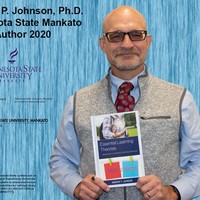A DTK Book Review: Phonics and Word Identification Skills — Strategies for Teachers and Parents, by Andy Johnson, PhD
Phonics is Not the Same as Reading
Dr. Johnson serves as Professor of Literacy and Distinguished Faculty Scholar at Minnesota State University, Mankato. His work currently focuses on research-based teaching strategies for students with reading difficulties. His website at www.OPDT-Johnson.com offers online professional development for classroom teachers.
So I wanted to know what he thinks about phonics instruction. Here’s a quote that sums up his work. “Sounding out words is of some importance in reading… it is NOT reading…A little phonics is good. That does not mean that a lot of phonics is better.…phonics instruction is necessary but far from sufficient.”
Reading Means Getting Meaning out of Text
In this book, Phonics and Word Identification Skills, Dr. Johnson lays out an effective way to use phonics. He recommends embedding phonics instruction into high-interest stories, using methods that do not shame or frustrate. Johnson stresses the importance of learning words in context and in using interesting material that the students choose. He wants to avoid producing students who look and say, without comprehension. In my own experience, this is a common outcome when phonics-only methods are used. Dr. Johnson states, “Words are stored in long-term memory primarily around meaning, not around letter patterns.” He shares the research to back up this claim.
This Book is For Classroom Teachers
My book, Dyslexia Tool Kit, parallels Dr. Johnson’s ideas. But my book targets parents and tutors working one-on-one or in small groups. I streamlined it for use by people from fields outside education. It’s designed to read quickly and apply immediately.
Dr. Johnson’s book, on the other hand, perfectly meets the need of classroom teachers. He includes complete lesson plans, suggestions for IEP goals, and ways to meet standards while ALSO meeting the needs of the students who struggle with reading. It’s a rich resource.
The Best Method is the One that Produces a Love of Reading
If a reading instruction method doesn’t cause students to fall in love with books, it’s faulty. But reject the idea that the more expensive a program is, the better it is; that’s simply marketing. Johnson points out, “If any method is so complicated that teachers need to get special training to use it, it most likely is a mirage.”
Dr. Johnson’s methods aren’t complicated — any classroom teacher can easily read and understand his work and the research he highlights. This book provides a clear path to including phonics in reading instruction without overdoing it and making kids hate reading. Good stuff. Find Johnson’s work via his books or his Youtube videos: [https://www.youtube.com/channel/UCdY7mNvoLNuqXdQcMuR1aNQ]
Dr. Johnson Understands the Science of Reading
For Johnson, calling something “research-based” raises questions. He wants to know how the research was done, by whom, and what it actually proved. Ahh, the REAL Science of Reading! Andy Johnson brings much-needed practical sense to the challenges faced by classroom reading teachers every day.
by Yvonna Graham, M.Ed.
www.DylexiaKit.net
